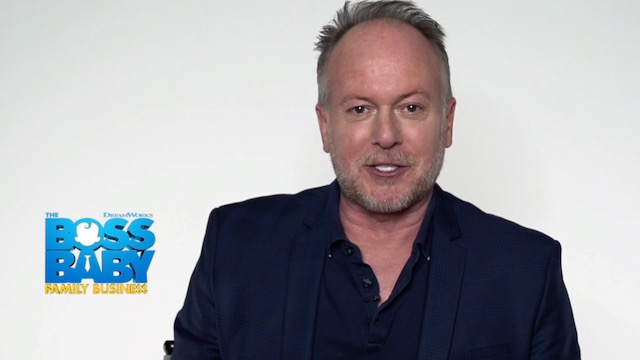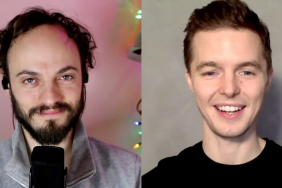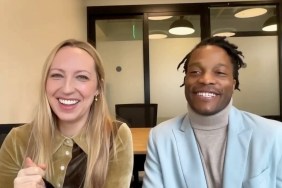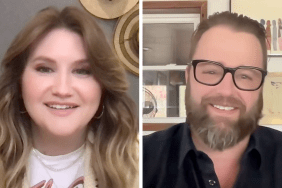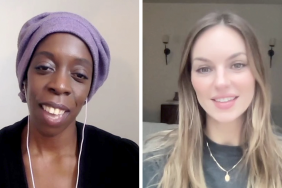ComingSoon recently got the chance to talk to The Boss Baby: Family Business director Tom McGrath ahead of the film releasing on 4K, Blu-ray, and DVD on September 14. It’s already available digitally.
“The Templeton brothers—Tim (James Marsden, X-Men franchise) and his Boss Baby little bro Ted (Alec Baldwin)—have become adults and drifted away from each other,” says the official synopsis. “Tim is now a married stay-at-home dad. Ted is a hedge fund CEO. But a new boss baby with a cutting-edge approach and a can-do attitude is about to bring them together again … and inspire a new family business.”
ComingSoon Editor-in-Chief Tyler Treese spoke to The Boss Baby: Family Business director Tom McGrath about his past projects, the future of the Boss Baby franchise, and what makes the sequel fun for the whole family.
Tyler Treese: Tom, I was really impressed by the film, just how it was able to blend so many relevant issues for adults in with the fun that the kids would enjoy. How important is it to make sure the films have something for everybody? I mean, these films are so popular because it’s a whole family experience.
Tom McGrath: Yeah. Well, that’s the ultimate goal. I just remember as a kid, I remember my parents would take my brother and sister and I to the Pink Panther movies with Peter Sellers. My parents would laugh at some of the adult humor and then my brother and sister, and I would laugh at the slapstick humor and it left a big impression on me because it was a movie like we could all kind of go together and enjoy in a way. We didn’t wanna have just parents take their kids to a movie and be bored. We wanted to entertain the whole family in a way.
It felt like with the sequel, we had an opportunity to not only have a strong female voice with baby Tina but also have the perspective of the parents as well. Whether it’s the father-daughter story with Tim and his daughter or the grandparents’ story. So it felt like there was much more access points for either kids or parents or grandparents to kind of not only laugh at ourselves but maybe hopefully move the audience as well.
Something I thought was really interesting was the distance that kind of grew between Ted and Tim over time. The film takes place like 40 years later after the originals. Ted’s this super successful businessman and he’s kind of forgotten about family. That work-life balance is something I think we all can struggle with. It’s a really real issue everywhere. Can you just talk about that theme? Did it come from something you’ve struggled with in the past as well?
I’ve always said the first movie was a love letter to my brother and early on when I was working with Michael McCullers on what we could do with this story, you always want to bring something personal to the story you’re telling. In my case, my brother and I always had a tumultuous childhood and as we grew older, he became a stay-at-home father and I got the opportunity to make films, [which is] something we both did as in our childhood. I was always kind of envious of him because I never had a family myself. I was always so work-driven and he has wonderful kids. I was always a little bit envious of that because I thought that was a real measure of success, your family.
Then he was slightly envious of me because I got to go off and make films, which was a shared dream with both of us. So there’s a little bit of that in the movie. But I think with my brother and I story or with all our family stories is that sometimes you can drift apart and get so involved with your job or whatever that you can forget to pick up the phone and connect with your family. We just thought, oh, it’d be great opportunity because life is short and family is very important, so that an audience would think about family members, maybe they disconnected with and pick up the phone after they saw the movie and say hello, or I’m sorry, or I love you, which feels like it’s very common with all of us.
We just felt like it’s nice to have a theme disguised in comedy that actually moves people. They say that laughter’s the doorway to the heart, you know? Not only do we have the brother story, we really wanted to touch on the father-daughter story and just thought it would be interesting as a parent to be able to see your child in school and connect with them on a level, not as a parent, but maybe their weird friend in school as in Tim’s case in this movie. So we just thought if we can make people laugh, but also at the end of the day move people as well, then we’ve done our job.
Speaking to the father-daughter relationship. I really loved Tim kind of seeing Tabitha kind of growing up too fast. She idolizes Ted, and she’s kind of getting away from enjoying her childhood. She wants to be more business-focused and I love how that story came around. Then, like you mentioned, at school he gets to see this whole different side of her that she’s maybe not as upfront about. Can you speak to that theme and just seeing a child just kind of want to go into adulthood rather than enjoy the now?
Childhood is such a precious time in all of our lives and it’s very short and you can never really go back. I just thought it was interesting character-wise if Tim kind of held onto his childhood so much so that, his growth is he needs to become a better parent. We just thought it was funny that his daughter is more like Boss Baby than him, who was much more practical and thinks imagination maybe isn’t important as academic schoolwork.
But I remember when I was a kid, when I reached junior high, I stopped kissing my father goodnight thinking I was too old to do that. You know? Then a couple of years later, my mom said, “Well, your dad really misses the fact that you don’t kiss goodnight anymore.” I had no idea. I thought I was too old for it. So every night after that, while he was still alive, I’d kiss him goodnight on the forehead, and I just saw how important that was to him.
There’s a bit of that in the movie, you know what I mean? We just wanted to celebrate childhood in a way where with academics, pressure, schools, or kids wanting to grow up too fast, that the movies are really a celebration of childhood, and you’re always gonna be an adult later on in life. To enjoy those precious moments where you get to use your imagination and be free in a way, plus it was just fun to think about there’s always a kind of wish-fulfillment. I think of everyone going, if I could go back to my childhood and have a do-over with the information I know now, what would I do with that? So there’s an element of that of Tim being able to become his daughter’s weird friend in school to get more insight into being a better parent in a way.
There’s this fight scene semi-early on between Ted and Tim, where they’re drinking from that bottle that makes them de-age. I thought that was just so much fun. How was it like coming up with that action-packed scene? So much of this is a comedy, but I feel like the action’s kind of underrated. Like there’s some really great fight scenes in here.
Oh, thanks. We wanted to have some fun action moments and early on, Michael McCullers wrote some fun dialogue. We just thought it’d be funny if they’re turning back into kids, but their arguments are so petty and all their laundry list comes out of their complaints against each other as they’re turning into kids again. It was in the early concept of the movie that they become very petty with their arguments, but also revert back to kids in a way. We just thought it was a funny premise that two grown men have to relive their childhood to be better adults in a way. The animators had a lot of fun. I think that’s where animation can shine with the broad comedy of them actually reverting back into their adolescent selves and down into the serendipity of just enough formula to turn them back into the characters from the first movie. So I know had a great time with that sequence as well.
I saw one of your earliest jobs was on Ren & Stimpy, and you directed, “I Was a Teenage Stimpy,” and that kind of has similar themes, although he is kind of fighting against growing up. I thought that was just so fun that this kind of theme of childhood into adulthood has kind of followed your career.
Yeah, it was fun. That episode in particular was kind of fun because Ren was so behind Stimpy. Growing up so fast, that’s always fun to play with a little bit and to laugh at going through puberty or going into adulthood. If we can laugh at ourselves, I think there’s a lot of that in Boss Baby. Similar themes of Tim needing to grow up as a father. Laughing at ourselves is great medicine I would say to heal all our problems with family. So there’s probably more of that in Boss Baby 2, and whether you’re a parent looking at your kids or whether your kids are relating to the baby boss or baby Tina and that sort of thing.
I love that this got a Peacock release because with a pandemic so many households are finding it difficult to get to the theater, especially with kids and bringing everybody out there. Were you glad that you could reach everybody that really wanted to see the film rather than locking it away?
I mean we design these movies for the big screen, and whether it’s in 3D or the sound work, the design work and all that, but we live in a time where you just want the broadest audience to see your movie. A lot of kids aren’t vaccinated and parents don’t feel comfortable taking them to the theater. So they have the option of watching it on TV, which is fine, especially with younger kids and you just wanna entertain as many people as you can. As a filmmaker, it’s a weird time because you wanna see it in the theater that’s packed and listen to the laughter, especially with kids and that sort of thing. But some people just don’t feel great about going to the theaters right now. So they have the Peacock option, which I thought was fantastic actually, plus you can use your own bathroom when you watch the movie, which is a plus for many people.
Definitely. You helmed the fantastic Madagascar movies and so many fans still wanna see another one. Are you still hopeful that we’ll see those characters again?
Yeah. They are near and dear to my heart in a way. Working with Chris Rock, Ben Stiller, Jada Pinkett, and everybody as part of those movies was always fun. It was nice to be able to have the opportunity to tell the entire story for the Madagascar characters, but you really have to think like, is there a story worth telling? Not just make a sequel for a sequel’s sake, but actually find a story like that is important to tell in a way. So we’ll see. You always spend three to five years working with the same characters to make an animated movie and they become like your children in a way. The characters, they’re very near and dear to your heart. So you’re always hoping for an opportunity to tell more stories with these characters.
During a Q&A, Alec Baldwin and Amy Sedaris said a third Boss Baby is in early development. I’m sure there’s not much to say at this stage, like you said, it takes so many years, but how excited are you that this franchise still has so much to give?
It’s nice to know that audiences relate to the characters in a way. So I always think of it as that being the first success, not just a sequel in a way. Like I said, I love working with the actors and I particularly love working with the artists. I think everyone on the crew had a connection with this movie that was special, whether it was the father-daughter story or the brothers’ story. I think that’s what propelled us to make this movie from home, cuz during the pandemic, 75% of the movie was made from home.
But the crew was so emotionally connected to the movie that everyone poured their heart and soul into it to make it worthy of the big screen but from home. So those are the things I find special about making the movie is working with the people again because that old saying it’s the journey, not the destination is so true in filmmaking and particularly animation where you’re together for so long. When the movie’s done, it’s your baby that’s out there to the world. But if you can pick up and work with the same actors, the same artists again, that’s the reward.
